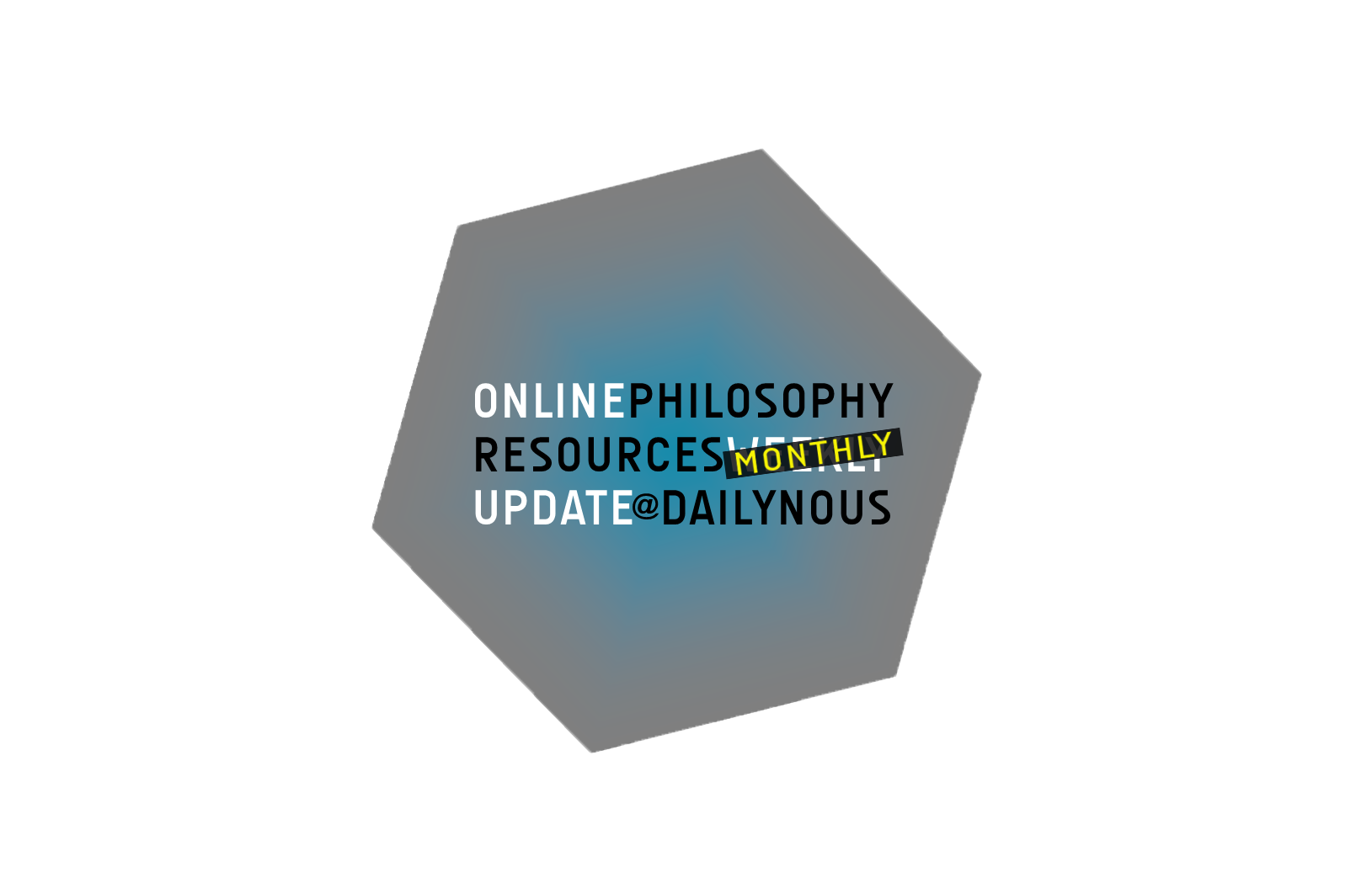Online Philosophy Resources Monthly Update
The usual weekly report on new and revised entries at online philosophy resources and new reviews of philosophy books is a monthly report this summer.
Here’s the edition for the past month. It will return to its weekly frequency in September.

New:
- Consequentializing by Douglas W. Portmore
- Margarete Susman by Willi Goetschel
- Natural Language Ontology by Friederike Moltmann
- Normativity in Metaethics by David Copp and Justin Morton
- Gene by Robert Meunier
Revised:
- Religious Experience by Mark Webb
- Constructive Mathematics by Douglas Bridges, Erik Palmgren, and Hajime Ishihara
- Mill’s Moral and Political Philosophy by David Brink
- Arguments for Incompatibilism by Kadri Vihvelin
- Hans-Georg Gadamer by Jeff Malpas
- Louis Althusser by William Lewis
- Group Rights by Peter Jones
- Kant and Hume on Morality by Eric Entrican Wilson and Lara Denis
- Kant’s Transcendental Arguments by Derk Pereboom
- Transworld Identity by Penelope Mackie and Mark Jago
- Intellectual Property by Adam Moore and Ken Himma
- Kūkai by John Krummel
- Philo of Alexandria by Carlos Lévy
- Dante Alighieri by Winthrop Wetherbee and Jason Aleksander
- Dialetheism by Graham Priest, Francesco Berto, and Zach Weber
- Metaphor by David Hills
- Peter Abelard by Peter King and Andrew Arlig
- Infinite Regress Arguments by Ross Cameron
- Common Knowledge by Peter Vanderschraaf and Giacomo Sillari
- Michel Foucault by Gary Gutting and Johanna Oksala
- Foundationalist Theories of Epistemic Justification by Ali Hasan and Richard Fumerton
- Peirce’s Theory of Signs by Albert Atkin
- Generic Generalizations by Sarah-Jane Leslie and Adam Lerner
- Heinrich Rickert by Andrea Staiti and Luca Oliva
- Harriet Taylor Mill by Dale E. Miller
- Pragmatic Arguments and Belief in God by Jeff Jordan
- Moral Dilemmas by Terrance McConnell
- The Metaphysics of Mass Expressions by Mark Steen
- Identity by Harold Noonan and Ben Curtis
- Intention by Kieran Setiya
- Max Horkheimer by J.C. Berendzen
- Wesley Salmon by Maria Carla Galavotti
- Faith by John Bishop and Daniel J. McKaughan
- Kant’s Aesthetics and Teleology by Hannah Ginsborg
- Samuel Alexander by Emily A. E. Thomas
- Realism and Theory Change in Science by Stathis Psillos
- Gottlob Frege by Edward N. Zalta
- Bolzano’s Logic by Paul Rusnock and Jan Šebestik
- Hiddenness of God by Daniel Howard-Snyder and Adam Green
- Epicurus by David Konstan
- John Locke by William Uzgalis
- Carl Hempel by James Fetzer
- Jane Addams by Maurice Hamington
- Isaac Israeli by Leonard Levin, R. David Walker, and Shalom Sadik
- Ibn Bâjja [Avempace] by Josép Puig Montada
- Necessary and Sufficient Conditions by Andrew Brennan
- Leibniz’s Exoteric Philosophy by John Whipple
- Aristotle’s Ethics by Richard Kraut
- Respect by Robin S. Dillon
- Aristotle’s Political Theory by Fred Miller
- Legal Obligation and Authority by Massimo Renzo and Leslie Green
- Cosmological Argument by Bruce Reichenbach
- Phylogenetic Inference by Matt Haber and Joel Velasco
- Experimental Moral Philosophy by Mark Alfano, Edouard Machery, Alexandra Plakias, and Don Loeb
- Mysticism by Richard Jones and Jerome Gellman
- Republicanism by Frank Lovett
- Classical Logic by Stewart Shapiro and Teresa Kouri Kissel
- The Value of Knowledge by Duncan Pritchard, John Turri, and J. Adam Carter
- Elias by Christian Wildberg
- Certainty by Miloud Melkoniene and Jacques-Henri Vollet
- Frequently Asked Questions about Time by Bradley Dowden
- Bodily Awareness by Tony Cheng
- George Orwell by Mark Satta
- Epistemic Value by Patrick Bondy
- Psychologie, Seiendes, Phantasie by Franz Brentano (trans. Ion Tanasescu) is reviewed by Robin D. Rollinger
- Phenomenal Blackness: Black Power, Philosophy, and Theory by Mark Christian Thompson is reviewed by William Paris
- Human Dignity and Political Criticism by Colin Bird is reviewed by Ariel Zylberman
- Morality from Compassion by Ingmar Persson is reviewed by Colin Marshall
- The Moral Habitat by Barbara Herman is reviewed by Karl Ameriks
- A Philosopher Looks at Digital Communication by Onora O’Neill is reviewed by Mathias Risse
- Nietzsche’s PHilosophical Psychology by Mattia Riccardi is reviewed by Christopher Fowles
- The Problem of Affective Nihilism in Nietzsche: Thinking Differently, Feeling Differently by Kaitlyn Creasy is reviewed by Paul Katsafanas
- Philosophy of Space and Time: What is Space? by Dan Peterson
- Philosophy of Space and Time: Are the Past and Future Real? by Dan Peterson
- The Ethics of Mozi: Social Organization and Impartial Care by Henrique Schneider
Recent Philosophy Book Reviews in Non-Academic Media
- What We Owe our Future by William MacAskill is reviewed by Kieran Setiya at Boston Review and by Barton Swaim at the Wall Street Journal.
- The Internet Is Not What You Think It Is: A History, a Philosophy, a Warning by Justin E.H. Smith is reviewed by Ryan Kemp at Hedgehog Review and by Geordie Williamson at Australian Book Review.
- Metaphysical Animals: How Four Women Brought Philosophy Back to Life by Clare Mac Cumhaill and Rachael Wiseman is reviewed by Jenifer Ratner-Rosenhagen at The American Scholar.
- Think Like a Feminist: The Philosophy Behind the Revolution by Carol Hay is reviewed by Vrinda Nabar at Hindustan Times.
- Losing Ourselves: Learning to Live Without a Self by Jay L. Garfield is reviewed by Julian Baggini at The Times Literary Supplement.
Compiled by Michael Glawson
Bonus: Pointlessness



Folks interested in MacAskill’s new book may also like to check out my review of it, which is more squarely targeted at philosophers.
One thing I emphasize is that, “because it’s targeted at a general audience, the book doesn’t probe at edge cases or test longtermist principles in extremis in the way that academic philosophers might prefer. So, don’t expect discussion of whether it would (in principle) be worth torturing everyone alive today in order to reduce extinction risk this century by some tiny fraction of a percentage point… Instead, this book sensibly focuses on the urgent yet undeniable point that we really ought to take greater care not to wipe ourselves out (or otherwise neglectfully slip into a bad long-term trajectory).”
Setiya’s review is super-interesting (I especially liked his points about “retrospective shift” and the possibility of parity), but also potentially misleading insofar as it focuses so much on critiquing total utilitarianism, which is a much stronger view than the weak longtermism that’s the focus of MacAskill’s book!
Public-facing philosophical work of this sort generates an interesting tension between the concerns of the author (in this case, to draw attention to the moral datum that future generations matter too) and those of philosophical reviewers (who will naturally find it more interesting to probe at edge cases). It’s something to bear in mind when reading philosophical reviews, as one may otherwise come away with the sense that the book is advancing much more controversial claims than it really is!
It is disappointing if not disconcerting that the David Brink (revised) SEP entry on J.S. Mill’s moral and political philosophy has no reference to the work of Nadia Urbinati (in my judgment, one of our foremost political philosophers writing on topics in democratic theory and practice), in particular, her powerful and incisive essays on Mill’s The Subjection of Women (in several edited volumes) and her brilliant study, Mill on Democracy: From the Athenian Polis to Representative Government (University of Chicago Press, 2002).